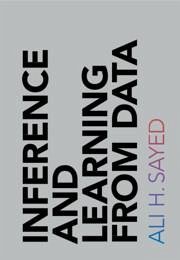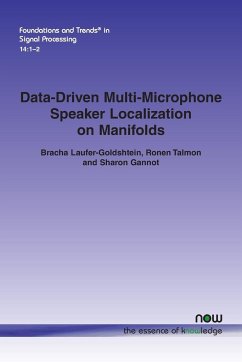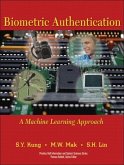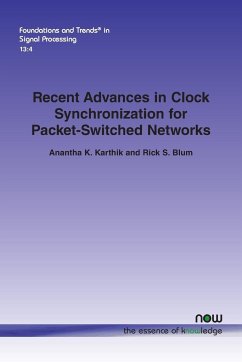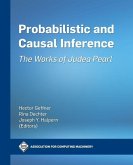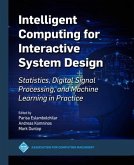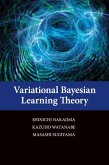Ali H. Sayed
Inference and Learning from Data
Ali H. Sayed
Inference and Learning from Data
- Broschiertes Buch
- Merkliste
- Auf die Merkliste
- Bewerten Bewerten
- Teilen
- Produkt teilen
- Produkterinnerung
- Produkterinnerung
This extraordinary three-volume work provides an accessible, comprehensive introduction to mathematical and statistical techniques for data-driven learning and inference. Ideal for early-career researchers and graduate students across signal processing, machine learning, statistics and data science.
Andere Kunden interessierten sich auch für
![Data-Driven Multi-Microphone Speaker Localization on Manifolds Data-Driven Multi-Microphone Speaker Localization on Manifolds]() Bracha Laufer-GoldshteinData-Driven Multi-Microphone Speaker Localization on Manifolds120,99 €
Bracha Laufer-GoldshteinData-Driven Multi-Microphone Speaker Localization on Manifolds120,99 €![Biometric Authentication: A Machine Learning Approach Biometric Authentication: A Machine Learning Approach]() S. Y. KungBiometric Authentication: A Machine Learning Approach148,99 €
S. Y. KungBiometric Authentication: A Machine Learning Approach148,99 €![Compressed Sensing with Applications in Wireless Networks Compressed Sensing with Applications in Wireless Networks]() Markus LeinonenCompressed Sensing with Applications in Wireless Networks105,99 €
Markus LeinonenCompressed Sensing with Applications in Wireless Networks105,99 €![Recent Advances in Clock Synchronization for Packet-Switched Networks Recent Advances in Clock Synchronization for Packet-Switched Networks]() Anantha K. KarthikRecent Advances in Clock Synchronization for Packet-Switched Networks74,99 €
Anantha K. KarthikRecent Advances in Clock Synchronization for Packet-Switched Networks74,99 €![Probabilistic and Causal Inference Probabilistic and Causal Inference]() Hector GeffnerProbabilistic and Causal Inference100,99 €
Hector GeffnerProbabilistic and Causal Inference100,99 €![Intelligent Computing for Interactive System Design Intelligent Computing for Interactive System Design]() Intelligent Computing for Interactive System Design70,99 €
Intelligent Computing for Interactive System Design70,99 €![Variational Bayesian Learning Theory Variational Bayesian Learning Theory]() Shinichi Nakajima (Technische Universitat Berlin)Variational Bayesian Learning Theory50,99 €
Shinichi Nakajima (Technische Universitat Berlin)Variational Bayesian Learning Theory50,99 €-
-
-
This extraordinary three-volume work provides an accessible, comprehensive introduction to mathematical and statistical techniques for data-driven learning and inference. Ideal for early-career researchers and graduate students across signal processing, machine learning, statistics and data science.
Hinweis: Dieser Artikel kann nur an eine deutsche Lieferadresse ausgeliefert werden.
Hinweis: Dieser Artikel kann nur an eine deutsche Lieferadresse ausgeliefert werden.
Produktdetails
- Produktdetails
- Verlag: Cambridge University Press
- Seitenzahl: 3370
- Erscheinungstermin: 22. Dezember 2022
- Englisch
- Abmessung: 290mm x 216mm x 162mm
- Gewicht: 5408g
- ISBN-13: 9781009218108
- ISBN-10: 1009218107
- Artikelnr.: 69963138
- Herstellerkennzeichnung
- Libri GmbH
- Europaallee 1
- 36244 Bad Hersfeld
- gpsr@libri.de
- Verlag: Cambridge University Press
- Seitenzahl: 3370
- Erscheinungstermin: 22. Dezember 2022
- Englisch
- Abmessung: 290mm x 216mm x 162mm
- Gewicht: 5408g
- ISBN-13: 9781009218108
- ISBN-10: 1009218107
- Artikelnr.: 69963138
- Herstellerkennzeichnung
- Libri GmbH
- Europaallee 1
- 36244 Bad Hersfeld
- gpsr@libri.de
Ali H. Sayed is Professor and Dean of Engineering at École Polytechnique Fédérale de Lausanne (EPFL), Switzerland. He has also served as Distinguished Professor and Chairman of Electrical Engineering at the University of California, Los Angeles, USA, and as President of the IEEE Signal Processing Society. He is a member of the US National Academy of Engineering (NAE) and The World Academy of Sciences (TWAS), and a recipient of the 2022 IEEE Fourier Award and the 2020 IEEE Norbert Wiener Society Award. He is a Fellow of the IEEE.
Volume I. Foundations: 1. Matrix theory
2. Vector differentiation
3. Random variables
4. Gaussian distribution
5. Exponential distributions
6. Entropy and divergence
7. Random processes
8. Convex functions
9. Convex optimization
10. Lipschitz conditions
11. Proximal operator
12. Gradient descent method
13. Conjugate gradient method
14. Subgradient method
15. Proximal and mirror descent methods
16. Stochastic optimization
17. Adaptive gradient methods
18. Gradient noise
19. Convergence analysis I: stochastic gradient algorithms
20. Convergence analysis II: stochasic subgradient algorithms
21. Convergence analysis III: stochastic proximal algorithms
22. Variance-reduced methods I: uniform sampling
23. Variance-reduced methods II: random reshuffling
24. Nonconvex optimization
25. Decentralized optimization I: primal methods
26. Decentralized optimization II: primal-dual methods
Author index
Subject index. Volume II. Inference: 27. Mean-Square-Error inference
28. Bayesian inference
29. Linear regression
30. Kalman filter
31. Maximum likelihood
32. Expectation maximization
33. Predictive modeling
34. Expectation propagation
35. Particle filters
36. Variational inference
37. Latent Dirichlet allocation
38. Hidden Markov models
39. Decoding HMMs
40. Independent component analysis
41. Bayesian networks
42. Inference over graphs
43. Undirected graphs
44. Markov decision processes
45. Value and policy iterations
46. Temporal difference learning
47. Q-learning
48. Value function approximation
49. Policy gradient methods
Author index
Subject index. Volume III. Learning: 50. Least-squares problems
51. Regularization
52. Nearest-neighbor rule
53. Self-organizing maps
54. Decision trees
55. Naive Bayes classifier
56. Linear discriminant analysis
57. Principal component analysis
58. Dictionary learning
59. Logistic regression
60. Perceptron
61. Support vector machines
62. Bagging and boosting
63. Kernel methods
64. Generalization theory
65. Feed forward neural networks
66. Deep belief networks
67. Convolutional networks
68. Generative networks
69. Recurrent networks
70. Explainable learning
71. Adversarial attacks
72. Meta learning
Author index
Subject index.
2. Vector differentiation
3. Random variables
4. Gaussian distribution
5. Exponential distributions
6. Entropy and divergence
7. Random processes
8. Convex functions
9. Convex optimization
10. Lipschitz conditions
11. Proximal operator
12. Gradient descent method
13. Conjugate gradient method
14. Subgradient method
15. Proximal and mirror descent methods
16. Stochastic optimization
17. Adaptive gradient methods
18. Gradient noise
19. Convergence analysis I: stochastic gradient algorithms
20. Convergence analysis II: stochasic subgradient algorithms
21. Convergence analysis III: stochastic proximal algorithms
22. Variance-reduced methods I: uniform sampling
23. Variance-reduced methods II: random reshuffling
24. Nonconvex optimization
25. Decentralized optimization I: primal methods
26. Decentralized optimization II: primal-dual methods
Author index
Subject index. Volume II. Inference: 27. Mean-Square-Error inference
28. Bayesian inference
29. Linear regression
30. Kalman filter
31. Maximum likelihood
32. Expectation maximization
33. Predictive modeling
34. Expectation propagation
35. Particle filters
36. Variational inference
37. Latent Dirichlet allocation
38. Hidden Markov models
39. Decoding HMMs
40. Independent component analysis
41. Bayesian networks
42. Inference over graphs
43. Undirected graphs
44. Markov decision processes
45. Value and policy iterations
46. Temporal difference learning
47. Q-learning
48. Value function approximation
49. Policy gradient methods
Author index
Subject index. Volume III. Learning: 50. Least-squares problems
51. Regularization
52. Nearest-neighbor rule
53. Self-organizing maps
54. Decision trees
55. Naive Bayes classifier
56. Linear discriminant analysis
57. Principal component analysis
58. Dictionary learning
59. Logistic regression
60. Perceptron
61. Support vector machines
62. Bagging and boosting
63. Kernel methods
64. Generalization theory
65. Feed forward neural networks
66. Deep belief networks
67. Convolutional networks
68. Generative networks
69. Recurrent networks
70. Explainable learning
71. Adversarial attacks
72. Meta learning
Author index
Subject index.
Volume I. Foundations: 1. Matrix theory
2. Vector differentiation
3. Random variables
4. Gaussian distribution
5. Exponential distributions
6. Entropy and divergence
7. Random processes
8. Convex functions
9. Convex optimization
10. Lipschitz conditions
11. Proximal operator
12. Gradient descent method
13. Conjugate gradient method
14. Subgradient method
15. Proximal and mirror descent methods
16. Stochastic optimization
17. Adaptive gradient methods
18. Gradient noise
19. Convergence analysis I: stochastic gradient algorithms
20. Convergence analysis II: stochasic subgradient algorithms
21. Convergence analysis III: stochastic proximal algorithms
22. Variance-reduced methods I: uniform sampling
23. Variance-reduced methods II: random reshuffling
24. Nonconvex optimization
25. Decentralized optimization I: primal methods
26. Decentralized optimization II: primal-dual methods
Author index
Subject index. Volume II. Inference: 27. Mean-Square-Error inference
28. Bayesian inference
29. Linear regression
30. Kalman filter
31. Maximum likelihood
32. Expectation maximization
33. Predictive modeling
34. Expectation propagation
35. Particle filters
36. Variational inference
37. Latent Dirichlet allocation
38. Hidden Markov models
39. Decoding HMMs
40. Independent component analysis
41. Bayesian networks
42. Inference over graphs
43. Undirected graphs
44. Markov decision processes
45. Value and policy iterations
46. Temporal difference learning
47. Q-learning
48. Value function approximation
49. Policy gradient methods
Author index
Subject index. Volume III. Learning: 50. Least-squares problems
51. Regularization
52. Nearest-neighbor rule
53. Self-organizing maps
54. Decision trees
55. Naive Bayes classifier
56. Linear discriminant analysis
57. Principal component analysis
58. Dictionary learning
59. Logistic regression
60. Perceptron
61. Support vector machines
62. Bagging and boosting
63. Kernel methods
64. Generalization theory
65. Feed forward neural networks
66. Deep belief networks
67. Convolutional networks
68. Generative networks
69. Recurrent networks
70. Explainable learning
71. Adversarial attacks
72. Meta learning
Author index
Subject index.
2. Vector differentiation
3. Random variables
4. Gaussian distribution
5. Exponential distributions
6. Entropy and divergence
7. Random processes
8. Convex functions
9. Convex optimization
10. Lipschitz conditions
11. Proximal operator
12. Gradient descent method
13. Conjugate gradient method
14. Subgradient method
15. Proximal and mirror descent methods
16. Stochastic optimization
17. Adaptive gradient methods
18. Gradient noise
19. Convergence analysis I: stochastic gradient algorithms
20. Convergence analysis II: stochasic subgradient algorithms
21. Convergence analysis III: stochastic proximal algorithms
22. Variance-reduced methods I: uniform sampling
23. Variance-reduced methods II: random reshuffling
24. Nonconvex optimization
25. Decentralized optimization I: primal methods
26. Decentralized optimization II: primal-dual methods
Author index
Subject index. Volume II. Inference: 27. Mean-Square-Error inference
28. Bayesian inference
29. Linear regression
30. Kalman filter
31. Maximum likelihood
32. Expectation maximization
33. Predictive modeling
34. Expectation propagation
35. Particle filters
36. Variational inference
37. Latent Dirichlet allocation
38. Hidden Markov models
39. Decoding HMMs
40. Independent component analysis
41. Bayesian networks
42. Inference over graphs
43. Undirected graphs
44. Markov decision processes
45. Value and policy iterations
46. Temporal difference learning
47. Q-learning
48. Value function approximation
49. Policy gradient methods
Author index
Subject index. Volume III. Learning: 50. Least-squares problems
51. Regularization
52. Nearest-neighbor rule
53. Self-organizing maps
54. Decision trees
55. Naive Bayes classifier
56. Linear discriminant analysis
57. Principal component analysis
58. Dictionary learning
59. Logistic regression
60. Perceptron
61. Support vector machines
62. Bagging and boosting
63. Kernel methods
64. Generalization theory
65. Feed forward neural networks
66. Deep belief networks
67. Convolutional networks
68. Generative networks
69. Recurrent networks
70. Explainable learning
71. Adversarial attacks
72. Meta learning
Author index
Subject index.

